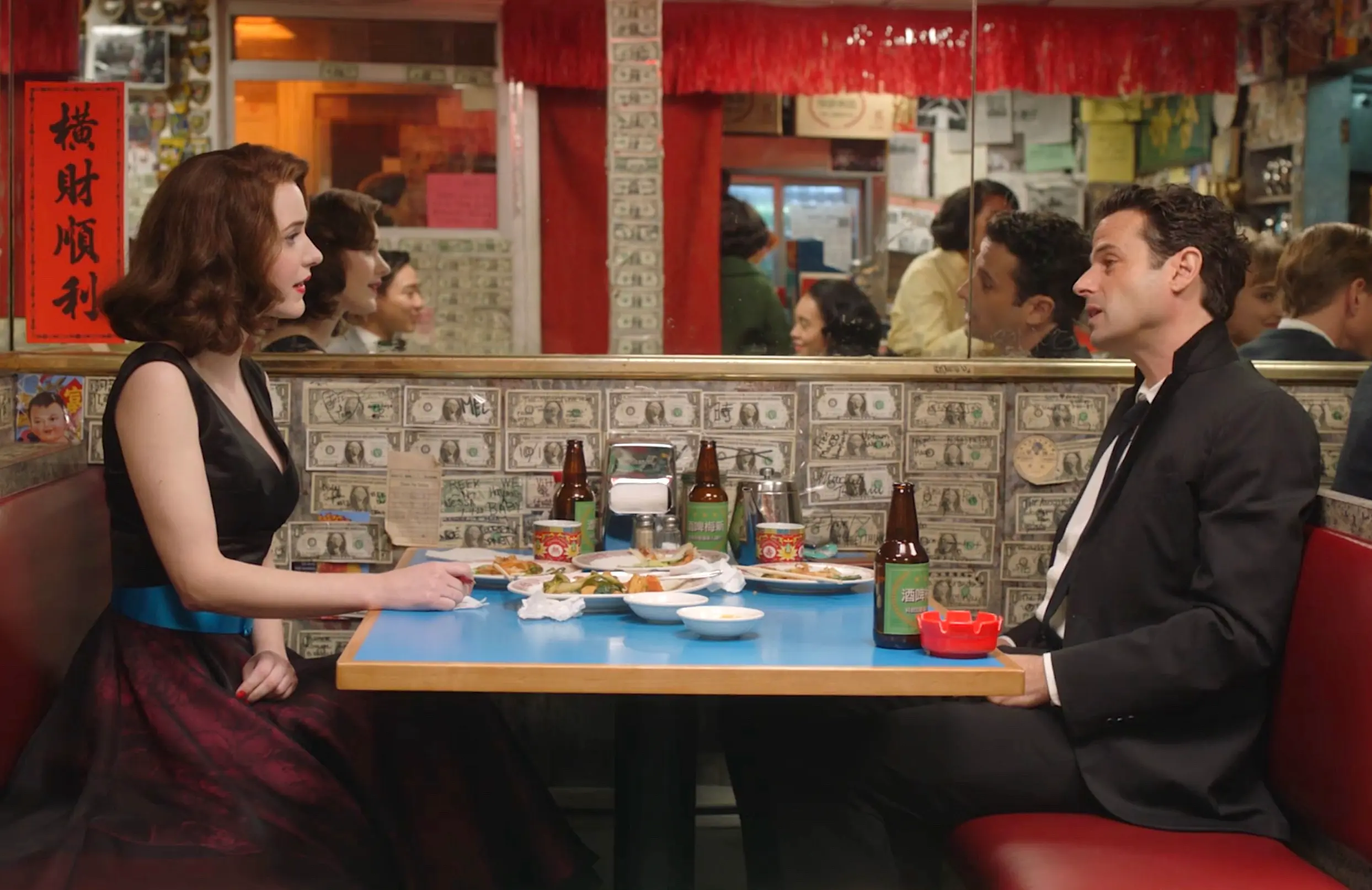Lenny Bruce Helps The Marvelous Mrs. Maisel Recapture Its Old Magic in Series Finale
-
 Rachel Brosnahan and Luke Kirby in The Marvelous Mrs. Maisel (Photo: Prime Video)
Rachel Brosnahan and Luke Kirby in The Marvelous Mrs. Maisel (Photo: Prime Video)The Marvelous Mrs. Maisel was an instant hit when it premiered in 2017. With a hefty Amazon budget at their disposal, creator Amy Sherman-Palladino and her husband/creative partner/series executive producer Daniel Palladino were able to create an aesthetically stunning series packed with some stellar, award-winning performances. The Emmy- and Golden Globe-winning series became Prime Video’s first multi-season series based on the strength of its pilot — the show was renewed for two more seasons within a month of the first episode dropping. That success gave Sherman-Palladino free rein to do just about anything she wanted, and while that freedom allowed for some truly excellent moments throughout the series, the lack of restraint and pressure to do it all also led to some major pitfalls.
Lenny Bruce (Luke Kirby) was always a standout in the series — his presence in an episode was always a sure sign of its good quality. The chemistry he had with Midge (Rachel Brosnahan) was evident from his first appearance in the pilot, and though he only showed up in 15 of the series’s 43 episodes, the character became an essential part of the show and Midge’s rise to fame.
But Lenny also presented a major hurdle. Unlike Midge and her family and many of her cohorts, all of whom may have been based on historical figures but were ultimately fictionalized, Lenny Bruce was a real person. A simple Google search comes up with pages and pages filled with the very public details of his life, his comedy, his time in prison, his infidelity, and his untimely death. Lenny worked best when Sherman-Palladino ignored those details, molding him into a charming companion for Midge, one who grounded the show in a certain sense of reality but was very clearly not meant to be completely factual. But whenever the story veered too closely into the realm of accuracy, he’d take a turn for the worse.
The series finale, “Four Minutes,” offers both sides of that coin. The opening scene shows Lenny in 1965 (one year before his death) as the real-life comedian actually was for the last decade of his life, drug-addled and unable to recall the details of his most famous jokes. He doesn’t accept an offer from Susie (Alex Borstein) to join her roster and book bigger rooms. He’s resigned to his fate and it’s implied that this is the last time Susie (and Midge, who’s hiding behind a doorway) see him alive. The show had hinted to his addiction and focus on his devious behavior before, but starting the final episode with this divergence into the darkest time of his life is jarring in a series that more often deals in cheer.
Luckily, it’s not the last viewers see of Lenny. Bookending the episode is a flashback to the night shown in Season 4’s finale, “How Do You Get to Carnegie Hall,” the night Lenny and Midge finally gave into their physical attraction to each other. And just after, as shown in “Four Minutes,” they enjoy a meal at a Chinese restaurant where they trade philosophies on fame, spewing Palladino’s signature banter with ease. The scene is colorful, aspirational, charming, and, in a way, fantastical. Lenny may have never had real conversation like this with a female comic like Midge, but it hardly matters because it’s simply a joy to watch.
Those two final Lenny Bruce scenes exemplify the push and pull that plagued the entire series. When trying to deal in reality and tackle darker or more culturally relevant issues, the Palladinos failed. It was admirable to see them try to comment on race, sexuality, politics, and true moments in history. In the final season, they challenged themselves to do something different creatively, including flash forwards showing the negative consequences of Midge’s dogged determination to become famous.
But this show was never a serious examination of the comedy industry. The pilot was so successful because it created something that, while based in history, felt otherworldly. Lenny and Midge’s first meeting was a meet-cute presented in a more sunshine-filled world than the one Lenny actually existed in. It was a world of pure escapism not bogged down by the rules of reality, one where Midge could make a living as a stand-up in a matter of months and Lenny Bruce was a heartthrob. The series's final episode manages to recapture some of that old magic, if only briefly.
The Marvelous Mrs. Maisel Seasons 1 through 5 are now streaming on Prime Video. Join the discussion about the show in our forums.
Brianna Wellen is a TV Reporter at Primetimer who became obsessed with television when her parents let her stay up late to watch E.R.
TOPICS: The Marvelous Mrs. Maisel, Prime Video, Alex Borstein, Amy Sherman-Palladino, Daniel Palladino, Lenny Bruce, Luke Kirby, Rachel Brosnahan
- Who did Wenne Alton Davis play in The Marvelous Mrs. Maisel? Actress dies in road accident at 60
- Don't Mistake Funny Woman for a Marvelous Mrs. Maisel Rip-Off
- Alex Borstein Makes a Dirty, Delightful Mess in Corsets and Clown Suits
- The Marvelous Mrs. Maisel Tackles the Ultimate Price of Stardom in Final Season